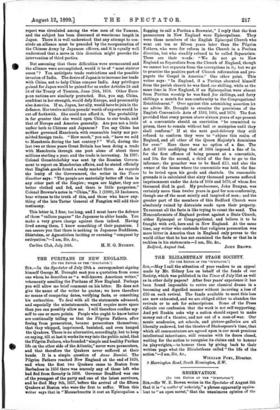THE LATEST RUMOUR FROM THE FAR EAST.
[TO THE EDITOR OF THE "SPECTATOR."]
Sin,—In your article on the above rumour of an offensive and defensive alliance between China and Japan you state that the rumour is possibly true, and that it seems news of most sinister omen. Will you permit a word or two of comment on its possible truth and significance ? It will be remembered that the rumour took definite form in the Times correspon- dent's account on July 25th of the mission of Ching Kuan and Liu Tun-tso, who, he stated, were "empowered to discuss a treaty of alliance between China and Japan." As long ago as November 19th, 1898, Ching Kuan and Liu Hsio-chih (who may be the person intended by the Times correspondent) were given permission to "travel in Western countries at their own 11,1 expense, and examine the commercial conditions of the places they visit." The former was then a brevet second- class Board Secretary, and the latter a brevet Prefect. Nobody at that time supposed that such men were likely to be chosen to discuss a treaty of alliance. Now at last they have gone to Japan (included among Western countries according to Chinese ideas), and the fame of their journey mobilitate viget viresque acquirit eundo. There have been many such rumours in Pekin, where the wish is father to the thought. When Marquis Ito last visited China, the same
•
report was circulated among the wise men of the Yamens, and the subject has been discussed at wearisome length in Japan. There it is well understood that any attempt to con- clude an alliance must be preceded by the reorganisation of the Chinese Army by Japanese officers, and it is equally well understood that a move in this direction might provoke the intervention of third parties.
But assuming that these difficulties were surmounted and the alliance were accomplished, would it be of "most sinister omen "? You anticipate trade restrictions and the possible invasion of India. The desire of Japan is to increase her trade with China, not to help China conquer India. Any privileges gained for Japan would be gained for us under Articles 24 and 54 of the Treaty of Tientsin, June 26th, 1858. Other Euro- pean nations are similarly protected. But, you say, China, confident in her strength, would defy Europe, and presumably also America. If so, Japan, her ally, would have to join in the defiance. Her twelve million pounds' worth of exports would be cut off forthwith. She could not afford it. The probability is far greater that she would open China to our trade, and that of Europe and America generally. Are you not a little unfair both to Chinese and Japanese ? You say China has neither governed Manchuria with reasonable lenity nor per- mitted foreign trade. "How much," you ask," have we sold to Manchuria during the last century ? " Well, during the last two or three years Great Britain has been doing a trade with Manchuria through one port alone of about three millions sterling a year, and the trade is increasing. In 1897, Colonel Grombtchefsky was sent by the Russian Govern- ment to report on Manchurian affairs, and he stated officially that English goods found a ready market there. As regards the lenity of the Government, the writer in the Times Gazetteer says : "The people are materially better off than in any other part of the Empire ; wages are higher, they are better clothed and fed, and there is little pauperism." Colonel Browne's notes in "China," No. 1 (1899), 53 Inclosure, bear witness to the truth of this, and those who know any- thing of the late Tartar General of Fengtien will add their testimony.
This letter is, I fear, too long, and I must leave the defence of those "callous pagans" the Japanese to abler hands. You make a very grave charge against them indeed. Having lived among them, I know something of their paganism. I can assure you that there is nothing in Japanese Buddhism, Shintoism, or Agnosticism inciting or excusing "conquest by extirpation."—I am, Sir, &c.,



































 Previous page
Previous page